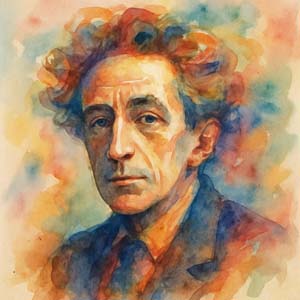— Jean Cocteau
 An artist who followed his own source and inspiration, writer Jean Maurice Eugène Cocteau (1889–1963) was born on this day in Paris, France. From an early age, he embraced creativity, calling it the "fever of crimson and gold."
An artist who followed his own source and inspiration, writer Jean Maurice Eugène Cocteau (1889–1963) was born on this day in Paris, France. From an early age, he embraced creativity, calling it the "fever of crimson and gold."
"It is not inspiration; it is expiration," he once said.
After his father's suicide, Cocteau was expelled from school and searched for meaning in tragedy. He chose a bohemian path of creation and experimentation. His dazzling poetry revealed truths and provided a moral compass for the artists of his time.
"Beauty is made out of connections," he explained. Cocteau was a master of self-promotion.
A multi-talented creator, he was influenced by friendships with composer Igor Stravinsky and artist Pablo Picasso. He blended fantasy, mythology, and theater into his work.
During World War I, he served as a Red Cross ambulance driver, capturing the horrors of the Battle of the Somme in stark photographs that later inspired his poetry and films.
"The poet doesn't invent. He listens," he said.
He directed his first film in 1925. His masterworks Beauty and the Beast (1945) and Orpheus (1950) are timeless. Through writing and directing, he introduced surrealism to French cinema as "a petrified fountain of thought."
After the death of his great friend Raymond Radiguet, Cocteau was inspired by essayist Michel de Montaigne to write The Difficulty of Being (1947), exploring life, death, and friendship.
He said, "What the public criticizes in you, cultivate. It is you."
More Film-Making Quotations
 Follow your own source.
Follow your own source.
